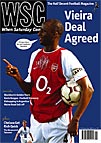 Snubbed again. Months after FIFA granted Oceania an automatic place in the World Cup, they have reversed the decision. Matthew Hall writes from a very angry continent
Snubbed again. Months after FIFA granted Oceania an automatic place in the World Cup, they have reversed the decision. Matthew Hall writes from a very angry continent
After FIFA’s Oceania World Cup backflip, neither Sepp Blatter nor UEFA’s Lennart Johansson should consider taking holidays in the South Pacific for the next few years. The two Europeans would normally receive excellent hospitality from southern hemisphere hosts, but, as figurehead and architect of FIFA’s turnaround on Oceania’s direct entry to World Cup finals, those days are gone.
Oceania’s (in)significance to the rest of the football world was underlined in the way FIFA broke the news. A June 28 press release trumpeted the 2006 World Cup would be played by 32 teams (so no change) but rev-ealed in a later paragraph that Oceania had lost its direct place while South America had another (all change).
The news created barely a ripple in Europe. In Aus-tralia, New Zealand and across the Pacific, it was tidal waves all around. “This is a nightmare,” Australia coach Frank Farina said to anyone who would listen. “We should disband Oceania. What’s the point of Oceania without a World Cup place? If we are a confederation, we should enjoy the same privileges as the others.”
Basil Scarsella, the usually diplomatic Australian president of the Oceania confederation (OFC), walked out of the June 28 FIFA meeting in Paris when the vote was passed 22-1 with the OFC the lone dissenters. “It’s unethical, it’s immoral, call it what you like,” he said.
Initially, FIFA suggested administrative chaos in Australia and New Zealand’s poor performance at the recent Confederations Cup were to blame. Certainly Soccer Australia, football’s top body Down Under, has suffered corporate anarchy in recent times, but a government-initiated coup this year saw Frank Lowy, the country’s soccer-loving third-richest man, installed as the game’s apparent saviour.
To blame us is just a convenient excuse,” said Soccer New Zealand chief Bill McGowan. “If you’re going to use that argument, then what about Saudi Arabia at the last World Cup? I don’t see anyone talking about taking a place off the Asians.” Had Australia qualified for the 2006 World Cup as OFC winners, they would have been unlikely to embarrass the region. The Socceroos’ track record over the past 24 months has seen victories over France, Brazil and Mexico at the 2001 Confederations Cup and England at Upton Park this year. “This is all about politics and nothing about football,” McGowan added. “I had a meeting with Blatter and [FIFA chief executive] Urs Linsi in Paris [before the decision] and they didn’t mention anything about this at all. It’s just bizarre.”
The fall-out also saw the return of Charlie Dempsey, the former OFC president whose infamous non-vote handed the 2006 finals to Germany rather than South Africa. Dempsey, now an “honorary advisor” (what-ever that is) to OFC, claimed he knew FIFA was set to reverse its decision two days prior to the vote. Unfortunately, he failed to tell any OFC delegates his news.
Both Australia and New Zealand have claimed the backflip has jeopardised commercial arrangements that were put in place earlier in the year and one OFC country is now no longer guaranteed the approximate US$6 million (£3.9m) teams earn for qualification, which would be a big boost in the cash-starved region.
The decision may have big implications for Blatter beyond holiday plans. Oceania unanimously supp-orted the FIFA president in his 2002 re-election campaign. After all, his daughter worked for Soccer Australia during the 1990s. Embarrassing scenes took place when Blatter’s rival, Issa Hayatou, arrived in the region to put his case for support: few Oceania delegates would listen to the African. Blatter, even with claims he had nothing to do with the decision, will probably not enjoy such blind backing again.
So, what next for Oceania? More of the same, no doubt. Like Mexico with Concacaf during the 1960s, 1970s and 1980s, Australia will continue to dominate the region. For World Cup qualification, the Socceroos will win games by cricket scores and then face a sudden-death play-off against a desperate, battle-hardened opponent given a second, or even third, life. The latest FIFA slap may encourage OFC to pursue more active ties with Asia and Concacaf, but that interest is mostly unrequited.
“We empathise with Oceania but the idea of a four-way play-off all comes too late,” Concacaf general secretary Chuck Blazer told WSC. “We have marketing plans and have sold TV-rights packages and our members have made plans for their own professional leagues. It is not whether we can accommodate a team from Oceania, it is how we change a system we had in place six months ago.”
If anyone would listen, Oceania would argue the exact same thing.
From WSC 199 September 2003. What was happening this month